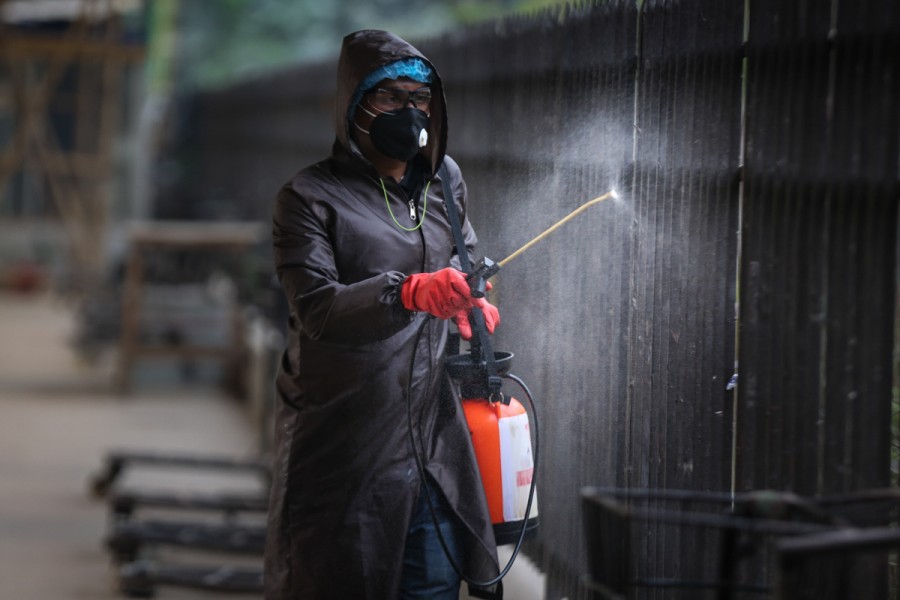A study has suggested the government work on three objectives simultaneously--enforcing strict physical distancing, increased entitlement support, and revamping public health system--- to help prevent the loss of life and livelihood during the coronavirus pandemic.
It has also made a plea for taking a nine-month plan to curb the pandemic effect. Robust testing and imposition of strict shutdown should be ensured during the first three months of the plan. Development of a strong public healthcare system for safe and gradual reopening of the economy need to be accomplished during the remaining six months.
A pool of experts, however, expressed doubt over the feasibility of some of policy recommendations made in the study as Bangladesh doesn't have the capability right now to take costly measures due to economic vulnerability.
The recommendations were put forward at a policy webinar on 'Coping with COVID-19: The Case of Bangladesh' organised by the General Economics Division (GED) under the Ministry of Planning on Tuesday evening.
The virtual event was supported by the BRAC Institute of Governance and Development (BIGD) and the International Growth Centre (IGC).
Professor Siddiqur Rahman Osmani of School of Economics at the University of Ulster in United Kingdom presented the keynote paper at the programme.
Moderated by BIGD Executive Director Imran Matin, Planning Minister MA Mannan addressed the event as the chief guest with Shamsul Alam, Member of GED under the Planning Commission, in the chair.
Power and Participation Research Centre (PPRC) Executive Chairman Dr Hossain Zillur Rahman, Bangladesh Institute of Development Studies (BIDS) Director General Dr KAS Murshid, Centre for Policy Dialogue (CPD) Distinguished Fellow Dr Debapriya Bhattacharya, Policy Research Institute (PRI) Vice Chairman Dr Sadiq Ahmed, and former Lead Economist of the World Bank (WB) Dr Zahid Hussain expressed their opinion on the content of the keynote paper.
In his presentation, Dr Osmani said enforcing physical distancing through temporary economic shutdown remains the first and foremost duty following a bold package for lending economic support to the households whose livelihoods have disappeared due to the economic shutdown.
A strong programme on public health support will facilitate safe reopening of the economy in the shortest possible time.
To do so, the government needs to allocate additional 6.0 per cent of the GDP to keep people free from hunger, boosting healthcare facility and supporting the enterprises in two phases--first phase would last for three months and the second one for six months, he said.
The policy package for economic support will have two major components--entitlement support for households and production support for enterprises, he added.
The study estimated that entitlement support for 20 million households which have become food insecure may cost around Tk 960 billion or about 3.8 per cent of GDP, Tk 8,000 per household.
The fiscal burden on account of economic support comes to about Tk. 1,300 billion ($15.1 billion), or just over 5 per cent of GDP while an additional allocation of at least 1.0 per cent of GDP will be required for the health sector, Dr Osmani said.
Delivering his speech, the planning minister said as per the experience of some of the worst-hit countries like Italy and Spain, the rate of coronavirus infections started flattening after 90 days.
"We have already passed 70 days and hoping for the downtrend in the infection rate in the coming weeks," he said.
Talking about gradual reopening of economy, he said, "I think it was not the right way to deal with the virus but it was the only way for us."
Terming Dr Osmani's core policy recommendations too costly for Bangladesh, the BIDS director general said there must be a second or third affordable option for the country to deal with the pandemic.
"We can't wait for the best solution as we don't have time," he said, adding: All the focus is on COVID-19 related deaths while non-COVID-19 patients are dying too because of not getting proper treatment.
The country needs cheap but effective solutions to train doctors and nurses, rapid testing for fast detection of infected persons, tracing their contacts and affordable measures to keep life and livelihood going, Dr Murshid added.
Dr Debapriya said according to Dr Osmani, if the three policy objectives are pursued altogether, there will have some trade-off but it was not clear on the paper where and when it will take place.
"Will it happen at the national level, community level, and sector wise or at household level," he wanted to know.
Contradicting with the study about making a new list of beneficiaries, he said the existing lists are incomplete and in some cases, overlapped and problem can be resolved through using NID database.
However, he recommended introducing universal pension scheme which may cover at least 31 per cent of the population in need.
Talking about source of funds, the CPD distinguished fellow said, "Money is no problem, the capacity to deliver is the problem."
At least 30 per cent of non-ADP expenditures are not used at all which can be diverted to the areas which were hit by the pandemic, he suggested.


